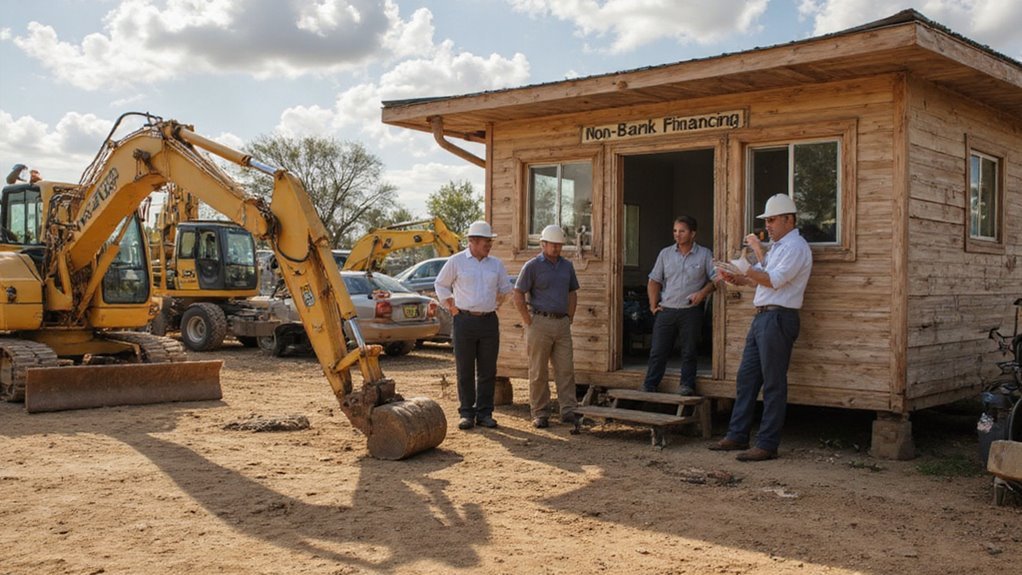Non-bank lenders can get you approved for heavy equipment financingA loan or lease specifically used to purchase business machi in periods instead of months because they actually understand your industry. You’ll need at least one to two years of business history, a credit score around 580–650 (though it’s not everything), and solid financial statements showing you can repay. They’ll want your tax returns, bank statements, and details about the equipment you’re financing—which becomes your collateralAn asset pledged by a borrower to secure a loan, subject to. The best part? They’re flexible and relationship-focused, not just about checking boxes. Uncover exactly what separates you from funding.
Key Takeaways
- Non-bank lenders approve businesses with credit scores as low as 580-650, prioritizing cash flowThe net amount of cash moving in and out of a business. and revenue over traditional credit metrics.
- Fast approval processes leverageUsing borrowed capital to finance assets and increase the po specialized underwriters and big data, enabling same-week funding with deposits within five business days.
- Required documentation includes two years of tax returns, financial statements, bank statements, business plan, and equipment specifications.
- Equipment serves as collateralAn asset pledged by a borrower to secure a loan, subject to, securing loans and reducing lender risk while potentially qualifying for tax depreciationAllocating the cost of a tangible asset over its useful life advantages.
- Businesses need at least one to two years operational history, consistent revenue, reasonable debt levels, and solid financial health.
Why Non-Bank Lenders Are Changing Equipment Financing

While traditional banks have dominated the lending environment for decades, non-bank lenders are rewriting the rules of equipment financingA loan or lease specifically used to purchase business machi in ways that actually work for real businesses like yours. These alternative lenders aren’t bound by the same rigid criteria that banks enforce, which means they’re offering more flexible terms and competitive rates customized for your industry’s unique needs. They’re streamlining the approval process through technology and specialized knowledge, cutting through red tape so you can get funded more quickly. Non-bank lenders understand construction, transportation, and manufacturing—they speak your language. Your financing options expand dramatically when you investigate these alternatives. They’re not just lending money; they’re partnering with businesses like yours to fuel growth and overcome obstacles traditional institutions would dismiss outright. Additionally, non-bank lenders often provide financing solutions specifically designed for those with bad credit, increasing access to necessary heavy equipment.
Speed of Approval: Getting Funded in Days, Not Months
When you’re running a business, waiting months for equipment financingA loan or lease specifically used to purchase business machi approval feels like watching paint dry—except your competitors aren’t waiting. Non-bank lenders have transformed the process by cutting through the red tape, so you can get approved and funded in a matter of days instead of the months traditional banks demand. Such speed gives you a real competitive edge, letting you seize opportunities while they’re hot and keep your operations moving forward without unnecessary delays. Many non-bank lenders featured in an Essential Guide to Leading Equipment FinancingA loan or lease specifically used to purchase business machi Lenders specialize in fast approvals tailored to heavy equipment needs.
Fast Track Approval Process
Unlike traditional banks that can keep you waiting weeks or even months for an answer, non-bank lenders have turned speed into their competitive advantage. The quick track approval process for non-bank heavy equipment financingA loan or lease specifically used to purchase business machi uses efficient application systems that cut through red tape. You’ll submit your documentation online, and specialized underwriters—who actually understand your industry—review your request rapidly. Many lenders utilize technology and big data to assess risk more quickly and accurately than conventional methods. This means financing enables equipment acquisition in a matter of days rather than months. You’re not just getting approved; you’re getting approved by people who recognize your business’s potential and can move at the pace your growth demands.
Same-Week Funding Timeline
Speed gets even better when you’re talking about same-week funding. You’ll find that non-bank heavy equipment financingA loan or lease specifically used to purchase business machi providers can move at lightning speed—sometimes approving your application and depositing cash within five business intervals. Here’s what makes this possible: these lenders use efficient digital processes and understand your industry inside out, so they don’t get bogged down in endless red tape.
When you’re working with how businesses get approved through non-bank channels, you’re tapping into systems designed for speed. They’ll evaluate your working capital, assess your financing for new and used equipment needs, and offer flexible repayment options customized for your cash flowThe net amount of cash moving in and out of a business.. No more waiting months wondering if you’ll get approved. That’s the innovation you deserve.
Minimum Qualifications Your Business Needs to Meet
Before you fill out that application, you’ll want to make sure your business clears the basic obstacles that non-bank lenders use to evaluate whether you’re a good fit. Most non-bank heavy equipment financingA loan or lease specifically used to purchase business machi companies want to see a credit history that’s decent—not perfect, but showing you pay your bills. You’ll need solid financial statements proving your business actually makes money. Lenders reviewing your loan application will check if you’ve been operating for at least a year or two. They’re looking for stability and demonstrating that you understand how businesses get approved. How businesses get approved often hinges in whether you can show consistent revenue and reasonable debt levels. Think about it as proving you’re ready for the next step. Additionally, many businesses explore financing commercial laundry machines as an example of how non-bank financing options can support purchasing essential heavy equipment.
Credit Score Requirements and Alternative Approval Paths
You might think your credit score is the paramount gatekeeper for equipment financingA loan or lease specifically used to purchase business machi, but here’s the good news: non-bank lenders aren’t as rigid as traditional banks when it comes to those three magic numbers. While most lenders do have minimum score thresholds (typically ranging from 580 through 650, depending upon the lender), they’re also willing to look beyond your credit report and consider factors like your business revenue, equipment value, and ability to repay. If your credit score isn’t where you’d like it situated, don’t panic—alternative approval paths exist that focus on your business’s actual strength rather than just your past financial decisions. Moreover, using non-bank lenders offers benefits like faster approval times and more flexible terms compared to traditional bank financing, making them a practical choice for equipment capital. This flexibility is a key reason many businesses prefer non-bank lenders for equipment financingA loan or lease specifically used to purchase business machi.
Minimum Score Thresholds
Uncertainty about credit scores shouldn’t be the reason your business stays stuck in the sidelines. Here’s the truth: non-bank heavy equipment financingA loan or lease specifically used to purchase business machi doesn’t operate under the same rigid rules as traditional banks. You’ve got options, even if your credit score isn’t perfect.
| Credit Score Range | Approval Likelihood | Typical Interest Rates |
|---|---|---|
| 750+ | Very High | 4-7% |
| 650-749 | Good | 8-12% |
| Below 650 | Possible | 13%+ |
Non-bank lenders evaluate your whole story—cash flow, industry experience, and collateralAn asset pledged by a borrower to secure a loan, subject to value matter tremendously. A lower credit score might mean a higher down payment or steeper interest rates, but it won’t automatically disqualify you. Many specialized lenders focus on businesses getting approved based on operational strength rather than just numbers. You’re not locked out; you’re just progressing differently.
Beyond Credit Score Assessment
While your credit score tells part of your story, this is only one chapter in a much longer book that non-bank lenders are reading about your business. Non-bank lenders look beyond those three digits to understand your complete financial scenario. They’ll examine your cash flowThe net amount of cash moving in and out of a business., business revenue trends, and industry experience. Even with bad credit heavy equipment financingA loan or lease specifically used to purchase business machi opportunities exist through collateral-based lending, where the equipment itself secures the loan. Strong credit history improves approval odds, sure, but it’s not the only path forward. Lenders assess your ability to generate revenue and manage debt responsibly. They’re interested in how you’ll use the equipment to grow. This comprehensive approach means more businesses qualify for financing how businesses get approved through customized terms suited to their unique situations.
Approval Without Perfect Credit
Because traditional banks treat credit scores like a gatekeeper’s supreme password, plenty of business owners assume a less-than-stellar score means game over—but that’s simply not how non-bank lenders function.
Non-bank heavy equipment financingA loan or lease specifically used to purchase business machi institutions comprehend that your credit history doesn’t define your business’s potential. They’re evaluating you comprehensively, looking beyond that three-digit number to see the real story. Here’s what alternative approval paths consider:
- Cash flowThe net amount of cash moving in and out of a business. and revenue trends – Strong income patterns matter more than past mistakes
- Equipment collateralAn asset pledged by a borrower to secure a loan, subject to value – The asset itself secures the loan, reducing lender risk
- Business fundamentals – Your industry, experience, and growth path speak volumes
Startup financing options are expanding too. Financial institutions offering transparency about their criteria help you understand exactly what they’re evaluating. You’re not locked out; you’re just taking a different door toward the equipment your business needs.
Essential Documents Required for Your Application

What’s standing between you and that equipment financingA loan or lease specifically used to purchase business machi approval? Often, it’s incomplete paperwork. When you’re applying for equipment financingA loan or lease specifically used to purchase business machi, best non-bank lenders for heavy equipment need to see your full financial overview. You’ll want to gather your business plan, tax returns from the last two years, and detailed financial statements. Lenders evaluate applications by reviewing your balance sheets, profit-and-loss statements, and bank statements—usually the last three to six months. Don’t forget your personal credit report and business license. If you’re wondering how to apply for a commercial equipment loan successfully, include specifics about the equipment itself: purchase price, specifications, and how it will enhance your operations. Having these crucial documents ready upfront accelerates your approval timeline greatly. Exploring non-traditional financing options can offer businesses alternative paths to secure heavy equipment funding when traditional bank loans are not accessible.
How Lenders Evaluate Your Business and Equipment Value
Once you’ve got your paperwork organized, lenders shift their focus towards evaluating what makes your business tick and whether that equipment is worth the investment. They’re basically asking: Can you actually pay this back?
Here’s what they’re really digging into:
- Your Cash FlowThe net amount of cash moving in and out of a business.: Lenders examine your revenue streams and expenses to confirm you’ll generate enough money for repayment terms. They want proof that you’re not just surviving—you’re thriving.
- Equipment Value: They assess whether the machinery itself holds resale value as backup security for commercial loans.
- Industry Knowledge: Non-bank lenders utilize specialized insight about your sector to understand market trends and your business’s growth potential.
Think of it as a three-dimensional snapshot of your operation’s viability.
Additionally, many lenders operate as asset-based lenders, which means they base loan approvals heavily on the value of your equipment and other assets rather than just your credit history.
The Role of Equipment as Collateral in Approval Decisions
When you’re applying for equipment financingA loan or lease specifically used to purchase business machi, the machinery you’re purchasing becomes more than just a tool for your business—it transforms into collateralAn asset pledged by a borrower to secure a loan, subject to that either strengthens or weakens your approval odds. Here’s the thing: lenders care profoundly about what secures their investment. The equipment serves as collateralAn asset pledged by a borrower to secure a loan, subject to, giving them confidence in your application. Non-bank lenders offer flexible terms because they understand your industry’s specific needs. When businesses secure financing in this manner, they’re leveraging tangible assets that hold real value. You’ll also find potential tax advantages through equipment depreciationAllocating the cost of a tangible asset over its useful life. By financing rather than buying outright, you preserve working capital for operations and growth. Think of collateralAn asset pledged by a borrower to secure a loan, subject to as your approval accelerator—stronger equipment value means better terms and quick decisions. However, lenders also evaluate your credit history carefully, as a poor credit history can impact your chances even when solid equipment collateralAn asset pledged by a borrower to secure a loan, subject to is provided, making understanding credit history’s effect essential for approval.
Non-Bank Financing vs. Traditional Bank Loans: A Direct Comparison

Now that you comprehend how equipment becomes your approval accelerator through collateralAn asset pledged by a borrower to secure a loan, subject to, it’s time to look at the larger picture: the financing landscape itself.
Here’s what distinguishes non-bank heavy equipment financingA loan or lease specifically used to purchase business machi from conventional bank loans:
- Quickness & Flexibility – Non-bank lenders operate swiftly, often approving applications in moments rather than weeks. They’re also more inclined to collaborate with unconventional business profiles.
- Specialized Knowledge – These funding options focus on specific industries, so they truly understand your equipment financingA loan or lease specifically used to purchase business machi needs without requiring you to clarify your business model.
- Customer Service Philosophy – Non-bank providers prioritize relationships over transactions, offering customized support throughout your loan term.
Conventional banks? They’re rigid and impersonal. Non-bank heavy equipment financingA loan or lease specifically used to purchase business machi providers understand how to obtain approval for heavy equipment financingA loan or lease specifically used to purchase business machi by accommodating *your* business, not forcing you into their one-size-fits-all mold.






